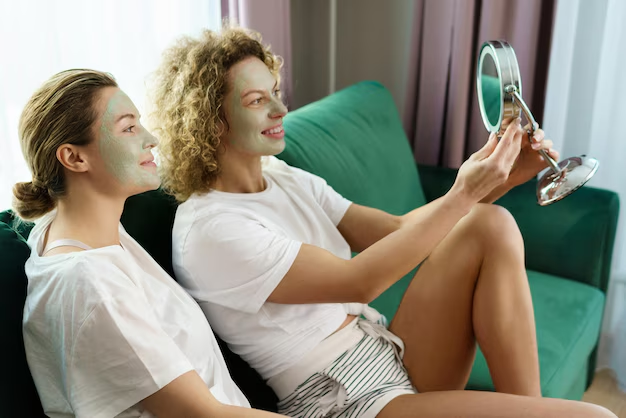Unmasking the Truth: Can Unhealthy Diets Really Cause Acne?
For many people, the connection between diet and acne is a riddle wrapped in a mystery. It's a theory passed around in whispers and anecdotes—"eating chocolate gives you pimples," or "fast food wreaks havoc on your skin." But how much of this chatter is grounded in truth? If you've ever pondered whether those guilty pleasure snacks are making a mark on your face, you're in the right place. Let's delve into the heart of the matter and unravel this complex web of skin science.
The Complexion Conundrum: What Causes Acne?
Acne is a common skin condition that can turn a clear complexion into a battleground of blemishes. But what exactly causes these flare-ups?
The Biological Basis
Acne primarily starts when hair follicles become clogged with oil and dead skin cells. This triggers a range of skin spots, from whiteheads and blackheads to larger cysts. Hormones also play a crucial role, especially during puberty, when the sebaceous (oil) glands go into overdrive, producing more oil and making the skin more prone to acne.
Triggers and Risk Factors
Several factors are known to exacerbate acne, including:
- Hormonal changes: Especially during puberty, menstruation, and pregnancy.
- Family history: Genetics can influence how prone you are to acne.
- Stress: Heightened stress levels may lead to more frequent outbreaks.
- Improper skin care: Using oil-based products or not cleansing the skin adequately can worsen acne.
But how does diet fit into this picture? Let’s dig deeper.
Is Your Diet Making Your Skin Break Out?
Debunking Myths and Misinformation
When it comes to skin health, misconceptions abound. For years, the blanket statement that greasy foods cause greasy skin has led many to blame burgers and fries for acne. While it's tempting to draw a direct line between what we eat and the condition of our skin, the truth is a bit more nuanced.
The Influence of Diet on Acne
Recent studies suggest diet can indeed influence acne, but the relationship isn't straightforward. Here are a few dietary culprits that have been studied:
High Glycemic Index Foods
Foods high in sugars and refined carbohydrates, such as white bread, chips, and sugary drinks, are believed to increase blood sugar levels rapidly. This blood sugar surge may trigger the body to produce more insulin, leading to increased oil production and, subsequently, acne.
Dairy Products
Milk and other dairy products have been scrutinized for their potential role in acne development. Some theories suggest that the hormones present in dairy can interfere with hormone levels in the body, thus stimulating excess oil production.
Fats and Oils
While not all fats are bad, certain types of oils and fats might play a role in acne. Diets high in unhealthy, saturated fats—found in fast foods and processed snacks—may contribute to inflammatory responses in the skin.
A Closer Look: How Food Affects Your Skin
Understanding the Role of Nutrition
Maintaining a balanced diet rich in essential nutrients can be beneficial not only for overall health but also for skin health. Here’s how different nutrients impact your skin:
Vitamins and Minerals
- Vitamin A: Found in carrots and sweet potatoes, it supports skin health and cell maintenance.
- Vitamin E: Present in nuts and seeds, it helps protect the skin from oxidative stress.
- Zinc: Known for its anti-inflammatory properties, zinc can support skin healing and reduce acne severity.
Healthy Eating Habits for Clearer Skin
Instead of focusing only on what to avoid, incorporating specific foods can bolster your efforts to achieve clearer skin:
- Omega-3 Fatty Acids: These healthy fats, found in fish and flaxseeds, are known for their anti-inflammatory properties.
- Probiotic-rich foods: Eating yogurt or fermented foods can promote a healthy gut, which might also improve skin health.
Lifestyle and Skin: Beyond What You Eat
While diet is an essential factor, it doesn't exist in a vacuum. A multidimensional approach to skincare can enhance your efforts to keep acne at bay.
Daily Skincare Routine
A sensible skincare routine tailored to your skin type is crucial:
- Cleanse Regularly: Remove makeup and impurities before bed to prevent clogged pores.
- Moisturize: Even oily skin needs hydration; choose a non-comedogenic moisturizer.
- Sunscreen: Protect skin from UV damage that could exacerbate blemishes.
The Stress Connection
Stress doesn't directly cause acne, but it can worsen it. When stressed, the adrenal glands produce more hormones, leading to oilier skin. Incorporate stress-management practices like yoga or meditation to help maintain balance.
Hydration and Sleep
Adequate water intake supports skin's retention of moisture, while proper sleep regenerates skin cells, helping reduce inflammation and acne.
Empowering Choices: Tips for Acne Management
Dietary Reflections
- Monitor how different foods affect your skin.
- Prioritize a diet high in fruits, vegetables, lean proteins, and whole grains.
Holistic Lifestyle
- Implement regular exercise to boost circulation and support detoxification.
- Practice good sleep hygiene to ensure restorative rest for your skin.
Mindful Skincare Practice
- Be gentle: Avoid picking or harsh scrubbing that could exacerbate acne.
- Choose skincare products wisely: Opt for those labeled non-comedogenic.
At the end of the day, skincare is personal. While diet influences skin health, other factors play significant roles. Understanding these elements allows you to take a proactive stance in managing acne and pursuing a holistic approach to a healthy complexion.
🔍 Quick Summary: Understanding the Diet-Acne Connection
- 🍰 High Glycemic Foods: May increase insulin, contributing to more oil production.
- 🥛 Dairy: Hormones in dairy might trigger acne for some individuals.
- 🔄 Balanced Diet: Include Omega-3s, vitamins A & E, and zinc for healthy skin.
- 🤸 Lifestyle Adjustments: Exercise, stress management, and adequate hydration are key.
- 🧴 Mindful Skincare: Choose non-comedogenic products, maintain a regular cleansing routine.
By understanding the nuanced relationship between diet and skin, you can make informed choices that support both your body and your complexion, paving the way for healthier skin and a happier you.

